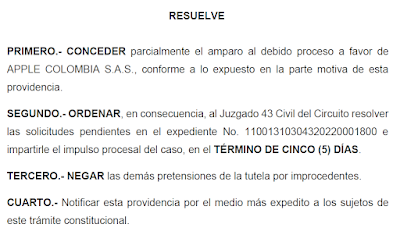A second attempt by Apple to overturn a 5G iPhone and iPad sales ban in Colombia has just failed as a Colombian court denied a petition by Apple, but the iPhone maker hasn't exhausted all procedural options yet.
The first failed attempt was an emergency motion that Apple had brought with the United States District Court for the Eastern District of Texas. The idea was to hold Ericsson responsible in the U.S. for its enforcement of a Colombian patent. On July 28, that motion was denied, with the sole exception of Apple being authorized to provide to its Colombian counsel some documents obtained in the U.s. discovery process, but not even the one Apple was most interested in sharing (an Ericsson-Samsung license agreement). Judge Rodney Gilstrap furthermore warned Apple of sanctions should another such misuse of court rules (filing an emergency motion without there being the kind of emergency for which it is designed) occur.
In parallel, Apple brought a "tutela" in Colombia's capital. A tutela is a kind of petition designed to immediately stop any violations of a party's fundamental rights. Apple even invoked Art. 8 of the famous Universal Declaration of Human Rights.
The Tribunal Superior de Bogotá (Superior Court of Bogotá) has just published its decision, which was authored by Judge Jorge Eliécer Moya Vargas and furthermore signed by Judges Oscar Humberto Ramírez Cardona and Jorge Hernán Vargas Rincón. The net effect is that
there was no procedural irregularity or other violation of Apple's constitutional rights by the court that ordered the preliminary injunction or Ericsson (or its Colombian outside counsel, OlarteMoure's Carlos R. Olarte), so the injunction remains in force, and
the only part of Apple's motion that succeeded is that the Civil Court No. 43 is ordered to provide within five days some clarification on the scope of the injunction that Apple had requested.
Basically, Apple is referred to the regulator appellate process, but can't obtain emergency relief on the basis of an alleged violation of its fundamental rights under Colombia's constitution.
In addition to its regular appeal of the preliminary injunction, Apple can appeal the denial of its tutela. The next court will then have to decide within 20 days on any questions involving Apple's constitutional rights.
By coincidence, there are presently two countries in which some smartphones are unavailable due to standard-essential patent (SEP) injunctions. Just a few days ago, OPPO and its OnePlus subsidiary stopped--for the time being--their German smartphone sales as Nokia is apparently enforcing one or more Mannheim injunctions (and obtained two SEP injunctions in Munich on Friday). OPPO hasn't closed down its German subsidiary, and customers continue to receive support; and unlike in the Colombian Ericsson v. Apple case, the injunction binds only OPPO itself, so its resellers are still able to sell products they have in stock or purchase outside of Germany. On Tuesday, the Dusseldorf Regional Court will rule on a couple more Nokia v. OPPO cases. I will then discuss the German situation in more detail. There are major differences between the two disputes. What this coincidence does show, however, is that Colombia is not the only jurisdiction in which a SEP injunction is presently being enforced.
Finally I'll show you a couple of screenshots from the Colombian order denying Apple's "tutela" (click on an image to enlarge):

